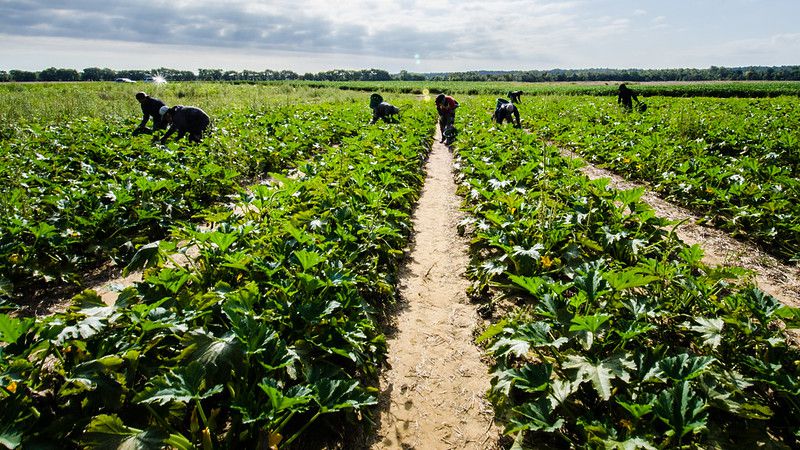2024 U.S. House Political Questionnaire - District 3
Published
10/7/2024
The Utah Farm Bureau reached out to candidates for the 2024 General Election for U.S. House District 3, Glenn Wright of the Democratic Party, and Mike Kennedy of the Republican Party. Utah Farm Bureau does not endorse candidates, and simply provides these answers to questions to help voters when making election decisions.
 Glenn Wright (Democrat) on the left, and Mike Kennedy (Republican), on the right.
Glenn Wright (Democrat) on the left, and Mike Kennedy (Republican), on the right.
TAX POLICY
Agriculture operates in a world of uncertainty. From unpredictable national situations to commodity and product market instabilities to fluctuating input prices, from natural disasters and damaging weather events to insect or disease outbreaks, running a farm or ranch business is challenging under the best of circumstances. Farmers and ranchers need a tax code that provides certainty and recognizes their unique financial challenges.
In Congress, what provisions would you support to help farmers and ranchers remain on the land and producing food, fuel and fiber?
Kennedy: During my public service, I have consistently defended our state’s farmers and ranchers as they perform their foundational function for society. The instability of nature and society are constant threats to their ability to provide food, fuel, and fiber for the rest of us. Considering this, my first policy priority is to maintain low tax rates on land and the necessary inputs to farm that land.
Life, liberty, and property are the most important protections our Constitution promotes. In my view, property taxes are the most burdensome form of taxation because they undermine true land ownership. If a person fails to pay, they risk losing their land. I will promote low taxes overall, and as a state senator, I have worked to lower state property taxes. Additionally, we should reduce taxes on diesel fuel, seed, farm equipment, fertilizer, and other essential inputs to ease the financial strain on our farmers and ranchers.
One significant burden on farmers and ranchers is the federal estate tax, commonly known as the "death tax." This tax can force families to sell off parts of their farms or ranches just to pay the government. I strongly support eliminating the federal estate tax to ensure that family farms can be passed down through generations without this crippling financial burden.
I also support providing low-interest loans to help family farms acquire the necessary equipment and resources for their operations. When disaster strikes, in whatever form it may take, the federal government has a role in helping our farmers and ranchers get back on their feet so they can continue to produce the essential goods our country relies on.
Finally, I pledge to maintain an open line of communication with the farming and ranching community. Whether in Washington, DC or back home in the district, I will always be available and ready to listen to your ideas on how we can champion and better support the agricultural community. Your insights are crucial for crafting policies that enhance the sustainability and prosperity of our agricultural sector.
Wright: It's important to acknowledge that agriculture operates in a world of constant uncertainty. From unpredictable weather events to fluctuating commodity prices and volatile input costs, farmers and ranchers face unique financial challenges that require a stable and fair tax code. I understand these challenges and am here to support you.
I will support provisions that give farmers more certainty and flexibility in Congress, including maintaining cash accounting rules and increasing Section 179 expensing limits for farm equipment.
Everything will be on the table as 2025 approaches and the 2017 tax changes expire. This allows us to revisit the tax code and ensure it supports the agricultural community. I want to reassure you that I am committed to working with you to ensure that future reforms not only grow the economy but also recognize the essential role that farmers and ranchers play in feeding our nation and sustaining our rural communities.
REGULATORY REFORM

All Americans have an interest in a regulatory process that is transparent and fact-based, respects the will of Congress, and observes the separation of powers in the Constitution. Federal regulations have a direct impact on farmers and ranchers, and over the years, the breadth and extent of that regulatory landscape have changed.
What actions would you take to ensure that the federal government’s regulatory burden on businesses such as farming and ranching is consistent with congressional intent? Would you support regulatory reform to ensure that federal regulations meet a cost/benefit test and make the process of writing new regulations more transparent, and if so, how?
Wright: Congress has the power to review and overturn federal regulations that unfairly burden businesses like farming and ranching. I understand that many farmers are concerned about regulations that make it harder to operate, from restrictions on land use to environmental rules. If these regulations go beyond what Congress intended, I will actively work with my colleagues to review, amend, or repeal them. My goal is to ensure that farmers and ranchers can focus on feeding our nation without unnecessary red tape, and I will always prioritize policies that allow you to do just that.
I fully support regulatory reforms that ensure federal rules governing farming and ranching are fair, transparent, and science-based. First, we must use sound science to ensure regulations are grounded in real-world outcomes. I will push for better coordination between the USDA and EPA so you aren’t burdened with conflicting rules. I will also support cost/benefit analyses to ensure new regulations don’t hurt farmers more than they help the country.
The rulemaking process should be open and transparent, giving farmers a clear understanding of how regulations are made and a chance to voice their concerns through a minimum 60-day comment period. Vigorous Congressional oversight will be essential to ensure agencies don’t overreach. I support litigation reform under NEPA to streamline the process and reduce unnecessary legal delays that harm rural communities.
Kennedy: Chevron deference has been judicially present for forty years now. I have written an op-ed on this subject, referenced here: https://mikekennedyforutah.com/2024/02/opinion-returning-power-to-the-people-why-chevron-deference-needs-to-end/.
In summary, the courts should not grant deference to every regulatory agency in every decision they make. I hope the U.S. Supreme Court will soon strike down Chevron deference. Once this happens, many regulations we have all had to live with may be challenged and overturned if there is no clear legislative intent that the regulation is what Congress intended. When Congress delegates its responsibility to be clear and specific in legislation to agency bureaucrats Congress fails to do its job. This often results in uncertainty for the American people and hampers business growth as regulations can change depending on the party in power.
As a state senator, I have worked to draft legislation clearly and precisely to prevent unelected bureaucrats from interpreting or effectuating the intent of my legislation. I will continue this approach at the federal level. If it is not clear how to move policy objectives forward, I will not promote or support such legislation.
Furthermore, the REINS Act is an opportunity for Congress to regain control over what sometimes becomes an out-of-control federal bureaucracy intent on politicizing the vital work that farmers and ranchers do. I strongly support the REINS Act, which would require Congress to approve any regulation that will cost society more than $100 million.
Additionally, the Waters of the United States (WOTUS) rule has imposed significant burdens on farmers and ranchers by expanding federal jurisdiction over various bodies of water, often including small streams and ditches on private land. I support efforts to roll back WOTUS to ensure that farmers and ranchers are not unfairly regulated and can manage their land without excessive federal interference.
Finally, we should investigate and potentially reduce funding for any agency that goes beyond the most basic responsibilities it has been given by the legislature. This demands accountability by ensuring that federal regulations are consistent with congressional intent, meet a cost/benefit test, and are developed through a transparent process.
ENDANGERED SPECIES ACT
Privately owned land provides habitat for the majority of our nation’s endangered and threatened species. As a result, landowners often face harsh regulatory restrictions on their ability to use the land or, worse, lawsuits or enforcement actions. Meanwhile, few species have actually been recovered under the law..
Is it time to think about incentive-based programs that create a positive role for landowners in species recovery? What recommendations do you have for reforming the Endangered Species Act, and what role would you assign America’s landowners?
Kennedy: Property rights are a foundational component of our Republic. However, with out-of-control bureaucrats and non-specific legislation, many agencies are violating property rights in significant ways. The EPA’s standard on the Waters of the U.S. (WOTUS) is a prime example of overbroad interpretation by an agency of legislation written in an ambiguous fashion. This can lead to untoward results where landowners cannot use their land in the most basic of ways.
In Utah specifically, we have had challenges with species such as the Prairie Dog and June Sucker, which have made it difficult to use private and public lands for the good of the people. Care for the environment must be balanced with the needs of society. The standard of proof for a species to be placed on the endangered list should be high. Additionally, the government should work with landowners in a positive, productive fashion to protect species that may be threatened.
Incentive-based programs could create a positive role for landowners in species recovery. This could include payments to landowners to facilitate protections, as well as reducing or eliminating taxes on the land if it is proven that such protections are necessary. Overall, I believe a cost/benefit analysis should be done in every case of a listing on the Endangered Species Act. When the cost exceeds the benefit, the advocates for protection should privately fund preservation efforts.
By working collaboratively with landowners, we can develop solutions that both protect endangered species and respect property rights. This approach ensures that conservation efforts are effective and that landowners are recognized as key partners in the process.
Wright: I strongly believe that America's farmers and ranchers are natural stewards of the land and should play a central role in protecting endangered species.
To reform the ESA, we need a system that incentivizes landowners rather than penalizes them. First, I would support the creation of voluntary conservation programs where farmers and ranchers are rewarded financially for preserving habitats on their land. This could be in the form of tax breaks or direct subsidies for conservation efforts. Additionally, I would advocate for better collaboration between landowners and regulatory agencies, where conservation goals are developed through local advisory groups. This way, we can create practical solutions that meet both farming needs and species protection goals.
I also believe we should streamline the ESA process by reducing unnecessary litigation and providing clearer, simpler rules that make it easier for landowners to comply. This includes offering legal protections to those who voluntarily participate in conservation efforts. Finally, I support transferring more control over species management to state and local governments. Local authorities understand the needs of their ecosystems and communities better than Washington does, and they can work more effectively with landowners to protect endangered species.
With these reforms, we can ensure that species protection is balanced with the rights of rural landowners, making conservation a shared responsibility rather than a regulatory burden.
AGRICULTURAL LABOR
Farmers and ranchers need a reliable, skilled workforce. Farm work is challenging, often seasonal and transitory, and with fewer and fewer Americans growing up on the farm, it is becoming increasingly difficult to find American workers attracted to these kinds of jobs. Farm labor can’t all be replaced by machines, either.
What role can Congress play in addressing the critical labor shortages that many farmers and ranchers face each year? How optimistic are you on finding workable (and passable) solutions to the labor crisis?
Wright: Farmers and ranchers depend on a reliable and skilled workforce to keep their operations running, but the seasonal and transitory nature of farm work makes it hard to find local labor. Immigration reform is critical to solving this labor shortage. By creating a more efficient and streamlined process for temporary and seasonal work visas, Congress can ensure that farmers have access to the workers they need during peak seasons.
These visas would allow migrant workers to come to the U.S. legally, perform much-needed work, and then return home in the off-season, as many of them wish to do. This system would not only benefit the agricultural industry but also provide stability and predictability for farmers, reducing the risk of lost crops or delays in production due to labor shortages.
I’m confident that with cooperation from both parties, we can find a balanced solution that supports the needs of farmers and protects American jobs. I’m committed to working on this issue because farmers cannot wait—Congress must act now to secure the workforce our farms and ranches depend on.
Kennedy: As a youth, I worked various jobs to support myself and put myself through school. My wife and I have continued to teach the importance of honesty and hard work to our eight children. I understand the challenges of hard labor and the importance of a reliable workforce. Our farmers and ranchers face a critical shortage of skilled workers, which threatens their ability to operate effectively.
Congress can play a key role in addressing these labor shortages by reforming immigration laws to ensure that farmers and ranchers can legally and efficiently hire the seasonal and permanent workers they need. I am a strong supporter of legal immigration, and I believe we can cut red tape to make it easier for workers to come to the U.S. to support our agricultural sector. This will benefit our farmers and ranchers by providing a dependable workforce and ensuring that our agricultural operations remain productive and sustainable.
As a proven legislator with experience in passing complex legislation, I am optimistic that we can find workable solutions to the labor crisis in agriculture. I am committed to working collaboratively in Washington, D.C. with anyone who has good ideas and the motivation to solve this problem. By doing so, we can support our farmers and ranchers and ensure they have the labor force necessary to continue their vital work.
PUBLIC LANDS
The federal government often changes policies regarding the management of public lands that impact agriculture and the multiple-use principle of public lands. More than 2/3 of Utah is public land in one form or another.
What will you do in your office to ensure that public lands can be used for the multiple uses they are designed for, including agriculture?
Kennedy: The people of Utah and those closest to our natural resources are the best equipped to be stewards of that land and those resources. Currently, over 65% of Utah’s land is controlled by the Federal Government. We need to stop the commandeering of additional Utah land through unilateral executive action (like the Antiquities Act); we also need to look for opportunities to move land back into the stewardship of the states. In the past, this has usually only been a “one-way” street of land being taken over by the federal government.
I strongly support the recent legislation introduced by our Utah Congressional Delegation to combat Biden’s Public Lands Rule that would allow conservation leases on public lands—potentially by organizations or people outside our State—that would preclude economic use and development of those lands.
Wright: Public lands are vital to the livelihood of many farmers and ranchers, especially here in Utah where over two-thirds of the state is public land. As we face a warming and drying climate, ranchers are seeing reduced access to water and grazing areas, making it harder to sustain their operations. In my conversations with the Summit County Farm Bureau, it became clear that recent droughts forced many ranchers to cull their herds, and while regenerative techniques can help restore rangelands, these solutions are often too expensive, and current BLM and Forest Service policies don’t reward land improvements with increased grazing access.
To fix this, I believe we need to reform public land management policies so that farmers and ranchers who invest in better land management practices, like regenerative grazing, are rewarded with increased AUMs. This would provide an incentive for land stewardship while ensuring our public lands remain productive for agricultural use. This is an area where it might be possible to work with environmental organizations. Reducing conflict between agriculture and environmentalists would be beneficial to all.
Mining and drilling are also important to our rural economy, particularly for accessing critical materials. But it’s essential that these operations are conducted with strong environmental controls to protect the land for grazing, farming, and to protect the public. I also support updating the Mining Act of 1876 to ensure that public lands are used responsibly and sustainably for all industries and the public.
With these reforms, we can ensure that public lands continue to support multiple uses, as they were designed to, and that farmers and ranchers can thrive while maintaining the health of the land for future generations.
TRADE
.jpg)
After decades of ag exports being a mainstay in our national balance of trade, the United States has been a net importer in agricultural trade since 2021.
- Does this raise national security issues?
- What can be done in your role to help this?
Wright: Yes, this shift raises serious national security concerns. When the U.S. relies more on agricultural imports, we risk becoming vulnerable to supply chain disruptions, geopolitical tensions, or instability in the countries we rely on for food. This could lead to food shortages or higher prices for American consumers.
For farmers, this also means fewer export market opportunities and more competition from imports. Imported goods put downward pressure on prices and make it harder for our domestic agricultural industry to compete. According to the USDA, the U.S. has been a net importer of agricultural products since 2021, a worrying trend that threatens both our food security and the future of American farming.
We need to be judicious in applying tariffs; while tariffs can protect domestic industries from unfair foreign trade practices, they often lead to retaliatory tariffs on American agricultural exports, which can harm our farmers by reducing market access and driving down prices.
Instead of relying on tariffs, targeted subsidies could better protect industries facing foreign competition. For example, many countries heavily subsidize their selected sectors; by offering strategic subsidies, we can protect affected industries and reduce the likelihood of countervailing tariffs that will make our agricultural products uncompetitive.
Kennedy: I believe the U.S. should be self-sufficient and even dominant when it comes to food, fuel, and fiber produced by our farmers and ranchers. It is a national security threat when we are dependent on unreliable and even unfriendly countries to provide us with our very sustenance. To that end, farm and ranch-friendly policies that enhance the ability of our farmers and ranchers to provide for society would always be top considerations in my service.
This may come in the form of tax modifications, reduced regulations, and providing necessary support for equipment and resources essential for farming operations. While I am not a fan of tariffs and corporate welfare, I do believe there is a role for the federal government to push back against foreign governments that place our farmers and ranchers in unsustainable positions.
With a record agricultural trade deficit predicted for 2024 and increased competition from overseas markets, the federal government must do a better job promoting U.S. exports and fighting for fair market access for our agricultural products.
Additionally, I am firmly against foreign countries owning farmland in the United States. I supported a bill in the Utah legislature’s 2024 session that banned certain countries from owning land in the state. Allowing foreign ownership of our agricultural land poses a significant risk to our national security and food supply. We need to protect our farmland and ensure it remains in the hands of American farmers and ranchers.
By supporting these policies, we can strengthen our agricultural sector, reduce our dependence on foreign imports, and enhance our national security.
GENERAL
Outside of agriculture, what are some of your main issues that you hope to address if elected?
Kennedy: I have been in public service for ten years and have worked vigorously to protect our farmers and ranchers during that time. Most recently, I worked with other legislators and the Farm Bureau to promote agri-tourism in a responsible and effective fashion.
Our border is a mess, our national spending is out of control, inflation is ruining our economy, and our people and businesses are struggling to keep afloat with a government that sometimes is weaponized against us. I will work collaboratively with my legislative colleagues to find common-sense solutions to the issues plaguing our society.
Securing our border, tackling inflation, and cleaning up the corruption in Washington are top priorities. We need to focus on solutions that make life better for our families and protect our freedoms.
As the father of 8 children and the grandfather of 9, I am committed to lessening the dysfunction in Washington for the sake of our children and grandchildren. While I don’t have all the answers, I have learned over the years that by working together, we can solve the complicated problems we confront.
Wright: I understand that rural communities face unique challenges, and my goal is to create solutions that work for everyone, including our farmers and ranchers. Outside of agriculture, I’m committed to addressing issues that affect your families and communities every day.
Affordable housing is critical for keeping our rural communities strong. When housing prices skyrocket, it becomes harder for young families and workers to stay in these areas, hurting local economies. I will work to expand affordable housing options so that rural Utahans can live and work in the communities they love.
Reaffirming personal agency means ensuring that every individual has the freedom to make decisions that shape their future without excessive government interference. I will protect your basic human rights to make your own private decisions.
Protecting our constitutional republic is essential to ensuring that power stays in the hands of the people. As a veteran, I took an oath to preserve, protect and defend the Constitution of the United States against all enemies foreign and domestic.
Finally, strong international alliances are vital to our national security. By maintaining these alliances, we strength our national defense.
At the heart of my campaign is the belief that we can create a path to freedom and prosperity for all Utahans. By addressing affordable housing, reaffirming personal agency, protecting our constitutional republic, and ensuring strong international alliances, we will create lasting opportunities for all Utahns and Americans.

